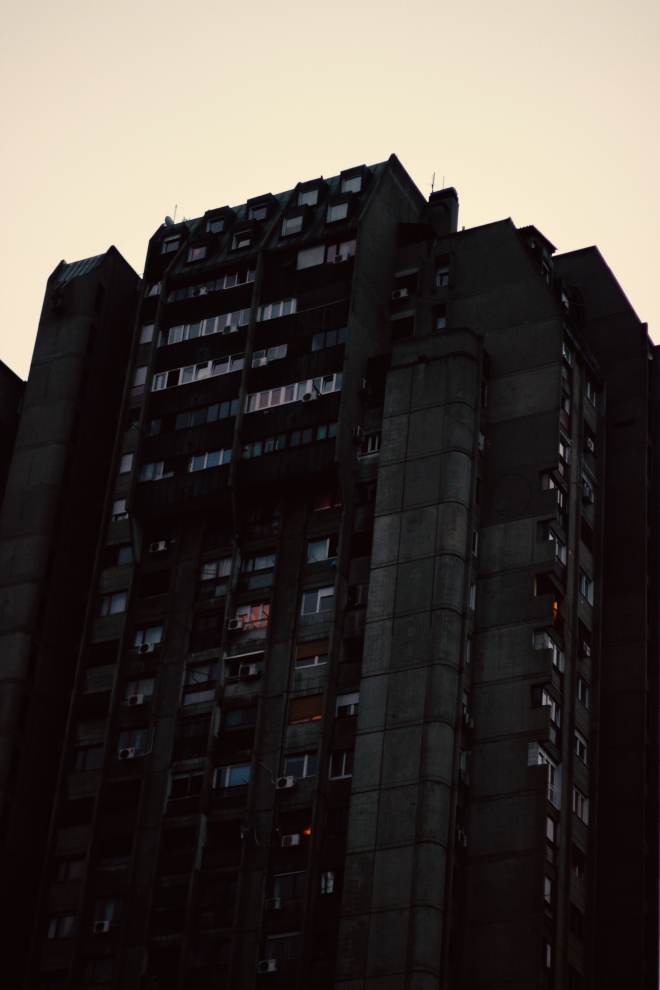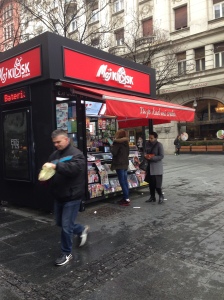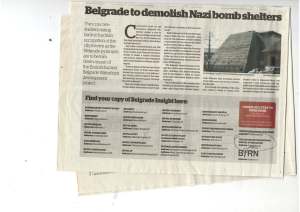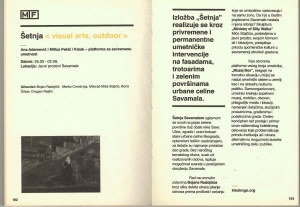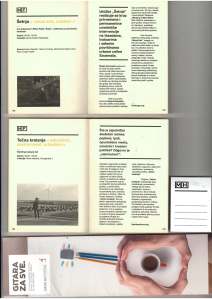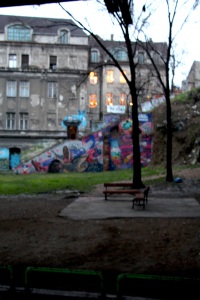Opening:“Im a passport to adventure.”* a book
(intro of brief set )
We will present our active group engagement of Belgrade’s culture, lifestyle and visual appearance in order to consider how a national identity has become re constructed after a historic period of conflict and manipulation. We will provide a visual consideration to Serbia’s artistic spaces and how these have become more recently restored by presenting to you the following themes: Control and manipulation; collective responsibility; and national identity – these themes will be identified by primary artefacts and by those of which have been shared by a range of participants.
Originally, concepts of power and national imagination became identified, prior to exploring Serbia.
Later we will identify a sense of surveillance culture that has become stimulated by the immergence of the digital world and the convieniance technology has become to offer though still restricting the values of a journalist.
“Visibility is a trap” (Foucault 1977:200).
In order to analyse this further, as a group, participants were contacted, established and connected with. Participants included a variety of voices that we have since listened to, from a series of expert and non expert interviews, a focus group with Belgrade University journalism students and immersing ourselves into a culture (ethnographic research) in order to fully expand how our knowledge is constructed that will therefore result in a greater understanding of how Serbia has had to start again from zero through the arts and visual mediation.
The connotations of riddles featured therefore relate to the current state of the national identify within Serbia: “The initial uncertainty it generated, however, does not simply evaporate, but lives on in our memory.” (Walsh 1998:113). An on going process that we will explore throughout this presentation and feature.
(brief overview of history?) – Adam?
An understanding of time and space during our visit at the Belgrade Fortress was preconceived and framed the way in which we have digested Serbia. Belgrade Fortress presents a response to time that is immeasurable and remains uncertain, which as will be later discussed, we have begun to realise is the current state of the national identity of Serbia: uncertain and an on going process of being established.
The (absent) discourse of speed and urgency is important for us to reflect on. Milan identifies a cruel optimism that suggests that we should look forward to a future of career and working life (DATE). However, the question we pose here is how can this become freely exerted in a state of control, which has been governed.
**Phenomenology – Merleau-Ponty (1945) “we can only experience temporality not know our own. If time stood still, if we would imagine it”.
The concept of imagination and social discourse of utopia originally became key for us to consider. This will be reflected in the concept of escapism through visual arts, media and stage performance by our experience within Belgrade (SUPERMARKET & Mikser).
The mediation of arts within Serbia has begun to re construct the nation, though it will be shown, how this process has not been as smoothly reformed as understood from our original understanding.
Beginning: “What can run but never walks, has a mouth but never talks, has a head but never weeps, has a bed but never sleeps?” (A river.)
We therefore draw upon the reality of time that can be constructed by others, such as those in power: government. Capitalism produced the social discourse that ‘money is time’ therefore time has become constructed as a resource and a commodity.
Contemporary culture has an obsession with possession and desperation for speed – therefore the send of speeding up time is presented but neglected within Belgrade. Considering an online networked society (Virilio 2000) there has become a type of ‘black hole of inter connectivity’ of which the layers of history has become formed, the layers of which has begun this sense of uncertainty of national identity that has trickled down to a younger generation that will later be assessed on how they become to escape from this collective responsibility.
(*a visual representation of layers can be shown through Belgrade’s numerous collection of street posters displayed, use Attwood for visual culture quote to show on the layers of history/ relating back to the history itself – adam Serbia dvds? A reflection?
It was important for us to consider our surroundings; space and how it is used in Belgrade in order to re construct our representation of how Serbia is using media to develop a national identity again.
(Adam) Irrespective of its size or locale, any space, provided it has been inhabited or maintained by humans, will carry a trace of their values and history. Architecture is an absolute medium, a physical and structural projection of the designer, and as such it will carry the sentiments of the cultures they originate from.
Belgrade is no exception to this rule, and its history seemed to be quite literally constructed around us, to the point where it was inescapable. Perhaps the departure from our native spaces played a part in our stark observations, I would argue that our pre-departure research and fixation on Serbia may had also had some effect on our perception, but ultimately traces of history and ideology manifest themselves everywhere: Sometimes it is the more abstract forms of representation, a building or a street for example, that bear the most explicit marks.
Therefore the idea of division and separation between the marginal and the cosmopolitan becomes increasingly important to consider: ‘the flow of time’ later becomes expanded through our analysis and recognition of the Serbian Government’s power to operate and distribution of media. Collective responsibility and memory remains to be considered.
“Build up”: “Pronounced as one letter,/And written with three,/Two letters there are,/And two only in me./I’m double, I’m single,/I’m black, blue, and gray,/I’m read from both ends,/And the same either way./What am I?” An eye.
“[An] unfinished state of an belated nation” (Ristic 2007: 193)
We will consier the notion of collective responsibility as a nation holds from consideration to previous research and expert interviews conducted during our visit to Belgrade (March 2015). We wish to emphasise the importance of memory, especially in spaces of corruption, manipulation and where time appears to stand still.
Considering our starting question: media artefacts are perceived to be collective memories in order to emphasise dates, events and individuals – however Serbia uses their own constructed media artefacts, such as music, to recognise a national identity. The production of music videos in Serbia (Reflect on the dvds??) have become apparent to show a timeline of Belgrade history that has become an on going process of reflection.
Leggewie (2013:101) identifies that European memory needs to be changed in order to “achieve full integration and collective identity”, Leggewie continues to suggest that a different memory needs to be reformed in order to completely re construct a new collective self-reflection of the state. Therefore emphasising the importance of memory, particularly within spaces of corruption.
Modules of power of the construction of the representation of the narrative are important roles to consider in order understanding that power is the ability to control narrative. A expert (semi structured) interview with Olja Beckovic (2015) provided an insight of the current state of media uncertainty that, in extract 1, can be identified as being the government’s power of the media, generating the voice of the people for them. Beckovic demonstrates in this extract her own role as journalist provides a sense of narrative power that was admired by the people.
Extract 1:
Esme Spurling: “So how would you describe the power of the media against the government of Serbia?”
Olja Beckovic: “I think all medias are under the control of government. So the prime minister is really obsessed with medias. And he controls everything, he watches all TV programmes and society networks and he knows everything what everyone wrote about him and he is all the time in problem and in conflict to discuss with journalists, ‘how dare you to ask the question and do your job’, he does not realise that it is possible to be on the other side of him he is sure that he is the best prime minister ever seen in the world.”
Beckovic (2015) immediately identifies the position of the Government in relation to the public media. Her identity as journalist and previous television presenter of ‘Impression of the Week’ (1991 until September 2014) should be acknowledged. ‘Impression of the Week’ hosted 3 guests that had the apparent freedom of speech to discuss recent news and provide comical insights, before Beckovic was asked to leave under B92’s instructions.
Therefore providing a platform for her audience to actively engage: Hasinoff (2014) points out that there is a certain ‘fear and promise of technology’ (2014:09). This ‘promise’ suggests the freedom of speech through technology that Hasinoff (2014) continues to suggest allows the user to adopt to a more dominant online identity, therefore taking into consideration the younger generation of Belgrade (accessing mobile technology that is more restricted) online technology can offer a ‘utopian democratic promise that users and viewers could become producers’.
Therefore we consider the sense of surveillance culture that can generate power over others, online and offline, stemming from Foucault ‘Panopticon Prison’ .
“We should admit… that power produces knowledge[…] power and knowledge directly imply one another” Foucault (1977:27)
Rose (2011) has more recently indicated that this type of surveillance culture has become a more dominant form of visibility “throughout modern capitalist societies”
Authenticity of new reports, globally though particularly within Serbia, becomes uncertain because of the unequal distribution of broadcasted independent press. Information that is received becomes censored before becoming under public scrutiny – therefore the understanding of reality develops to be obstructed with the truth. Websites were blocked, servers attacked and Twitter accounts hijacked in Serbia during 2014 – which made the reason for our specialist interview with CEO of independent media broadcasting organisation B92 Veran Matic more significant in order to gain a greater understanding of the state of media within Belgrade.
Tellmann (2009) continues to describe Foucault’s relationship to the silences of the ‘market based truth’ because of the ‘fractal-panopticon- that ceaselessly produces and co ordinates identity in accordance with the governmental rationality – again acknowledging the ability to purchase a voice ‘online’. It is interesting to consider the convergence to new media within Serbia and how this might produce offline consequences due to the nature in which media becomes (re)produced interaction occurs.
The Problem (middle): “I have holes in my top and bottom, my left and right, and in the middle. But I still hold water. What am I?” A sponge.
Those already in power are able to redistribute thoughts and values from their economic backgrounds – in regards to technology. The restriction to only one type of voice that is not marginalised, therefore only one version of events can be listened to online whilst the other is only heard.
Losonc (60:2014) points out that ‘neoliberalism is projected to manage a complex of freedom and non-freedom’, as previously discussed with Beckovic (2015) who strongly suggested that this was the most restriction journalists in Serbia had ever been in terms of voicing their opinions – despite the advancement of global and public communication online. Influenced by Tellmann’s “Foucault and the Invisible Economy” (2009:5-24), Losonc (2014) continues to add that the structure of history is always a combination of the ‘visible and the sayable’.
Bojana: “B92 was closed down and Mr. Veran was taken to prison in 2000. After that ban, we changed the strategy and we placed transmitters around the neighbouring countries, so the programme was aired from there and it was… illegal actually. But, It was aired. It couldn’t be banned.
Mandy: What do the citizens know more or less about the truth at that time? How they know the truth at this time? Do they find it easy to get the information at that period?”
Veran Matic: “In Milsevic’s time it was hard to find the truth about the killings that took place on behalf of Serbian people in general. But the citizens were able to find the truth if they followed independent media, although those media were not as powerful as the state media, so many of them were not in position to find out the truth.”
Solution: “I cover what is real and hide what is true, but sometimes I bring out the courage in you. What am I?” A Mask. To symbolise courage.
Literature can provide a sense of escapism and a sense of indulgence: young adults in Serbia have been bombarded with information upon information about the history of Serbia.
This can sometimes start to feel overwhelming for children to take in, so by reading Uros Petrovic books they can take themselves into their own world where they can gain a sense of who they are through their imagination. Growing up we get lost in a world that manipulates our minds to think in a certain way as we are always being told what is right and what is wrong so by reading Uros’s books on epic fantasies it allows Serbian children to create their own sense of identity with their own imagination.
An understanding of Dowling (2011:29) can re present the construction of knowledge of how visual arts can influence an audience: “a large part of self-understanding is the search for appropriate personal metaphors that make sense of our lives”. Therefore, emotional connection becomes established when reflection of memory and personal experiences of thoughts reframe a sense of imagination.
The layers of knowledge only restrict young peoples minds to explore a sense of the real. Uros Petrovic applies these same techniques when writing his books as he is allowing his audience to construct their own identity through what they read as this may be of more comfort to those children rather than having to live in the reality which is being forced onto them. Dowling (2011:02) continues to add, “sometimes we quietly hide parts of our identity and other times we loudly project it”. These books have become to form a sense of escapism that reforms identity, projected within printed words and expressed in the voices of a younger generation.
(*provide quote from university students!!!)
Conclusion:
Therefore beginning to expand on this on national identity and how this has been constructed through spaces such as Mikser (relating back to space/ time and responsibility) – (Adam) use mikser video??
Ongoing mixed opinions upon where the influence for Serbia national identity is/ where it comes from stems from: film TV and creative arts.
(using ideas from America and creative director (Charlotte) and the voices/ opinions of the students in juxtaposition to this (ES) upon America).
“One day, Belgrade will become great again” – driver.
